How Workforce Development is Making Energy Work
Each year, the North Carolina Sustainable Energy Association hosts the Making Energy Work (MEW) Conference in Raleigh, North Carolina. The conference brings together national stakeholders to explore cutting-edge policies and strategies for a clean energy transition, focusing on decarbonizing electricity, transportation, and building sectors through accessible, affordable solutions. As a pre-conference event this year, the NC Governor’s Office, NC Business Committee for Education, and the NC Department of Commerce co-hosted Mobilizing North Carolina’s Clean Energy Workforce for the Future. This workshop not only celebrated the historic economic development announcements, federal investments, and policies in North Carolina’s clean energy economy but also highlighted several organizations and workforce development programs across North Carolina that are engaging and building a talent pipeline for the current and future clean energy industry. North Carolina understands that with the rapid growth of clean energy resources in our state also comes the intense and immediate need for a skilled workforce to meet that demand.
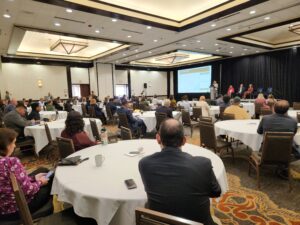
Leaders from across the state were given a mere five minutes to showcase all the fantastic work they have been doing and the resources that are available to the clean energy industry in North Carolina. Below is an equally quick rundown of the programs, initiatives, and resources mentioned during the workshop.
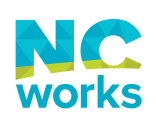
Jennifer Harris, Executive Director of Business Services at the North Carolina Department of Commerce opened the workforce development showcase by speaking about NCWorks Career Centers and NCWorks online. There are over 80 NC Works Career Centers across the state that support local businesses with services such as job applicant screening and qualified candidate referrals, labor market research, space to conduct job interviews, and help with arranging job fairs. These Centers and online portal are equally useful for job seekers with services such as career coaches, access to training opportunities and job fairs, resume assistance and interview preparation, connections with employers, and much more.

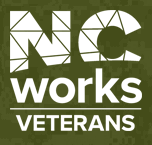
Dave Rakes, Director of Veteran Employment at NC4ME, and Gabriela Gonzalez, Director of Veteran Employment Services at the North Carolina Department of Commerce, highlighted the opportunities for veterans, transitioning service members, and their spouses in clean energy careers in North Carolina. NC4ME and NCWorks Veterans offer the same resources as above, plus services such as veteran-specific resources, occupational skills training, assistance with transferable military skills and/or civilian skills and education, and a list of HIRE Vets employers who are dedicated to veteran hiring, retention, and professional development.

Margaret Robertson, Vice President of Workforce Development at Central Carolina Community College, and Barbara Brothers, Business Engagement Director at Capital Area Workforce Development, presented on AdvanceNC, an advanced manufacturing ecosystem playing a pivotal role in filling the talent pipeline by creating partnerships between community colleges, universities, local workforce development boards, and employers to help workers build skills in fields ranging from electric vehicles and green energy to biotechnology and semiconductors.
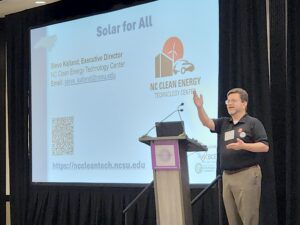
Steve Kalland, Executive Director of the North Carolina Clean Energy Technology Center, previewed the upcoming $156 million Solar For All program. The North Carolina EnergizeNC coalition, led by the North Carolina Department of Environmental Quality’s State Energy Office, in collaboration with North Carolina Advanced Energy, the North Carolina Clean Energy Technology Center, and the North Carolina Clean Energy Fund is currently developing a robust program to rapidly expand the number of residential and community solar and energy storage solutions in low-income and disadvantaged communities across North Carolina. An important aspect of this program is to also rapidly upskill a talented workforce that can meet the demands of this project’s overall goals. More about this program can be found at EnergizeNC.com. Make sure to sign up for updates as this project evolves.
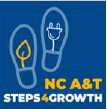
Kate Bashford, Project Manager located at Appalachian State University, and Michael Holmes, Apprenticeship Coordinator at NC A&T State University, presented on the Steps4Growth grant program, funded by the US Department of Commerce and led by NC A&T with the support of NC Business Committee for Education (NCBCE) and other partners. This workforce development project’s goal is to support employers to train students and adults to fill well-paying clean energy jobs in North Carolina. The Clean Energy NC Talent Hub is an outlet to allow job seekers and employers to connect on clean energy career opportunities throughout the state.
Wanda Ramos-McPherson with ApprenticeshipNC and the Community College System presented on the growing number of apprenticeship and pre-apprenticeship opportunities available in our state due in large part to North Carolina’s robust community college system. Employers and individuals interested in becoming apprentices are encouraged to visit ApprenticeshipNC to learn more about the industries with existing apprenticeships as well as how to become a registered apprenticeship provider.

Caroline Sullivan, Executive Director of the North Carolina Business Committee for Education finished the presentations with the last two initiatives, led by NCBCE. Career Launch is for youth 16-24 and designed to provide them with access to work-based learning opportunities to increase statewide post-secondary credential attainment and put them on the path to a career with growth in a high-demand field.

NCBCE is also a partner in the $30-million, 10-year Everyone Charging Forward Program, thanks to the Siemens Foundation, to create accessible career pathways in the EV manufacturing and charging sectors. NCBCE is collaborating with sectorial partners, industry leaders, and NC leaders to address providing equitable training and education for individuals from all backgrounds and to meet the rapid growth and demand for skilled workers in the EV charging sector.
A repeated call to action from the presenters was to get involved, share the resources highlighted, and recognize the important work that has been done and continues to be done to support North Carolina’s clean energy future. For more information about these initiatives as well as other workforce development opportunities and resources available in North Carolina, visit https://www.cleanenergync.org/.